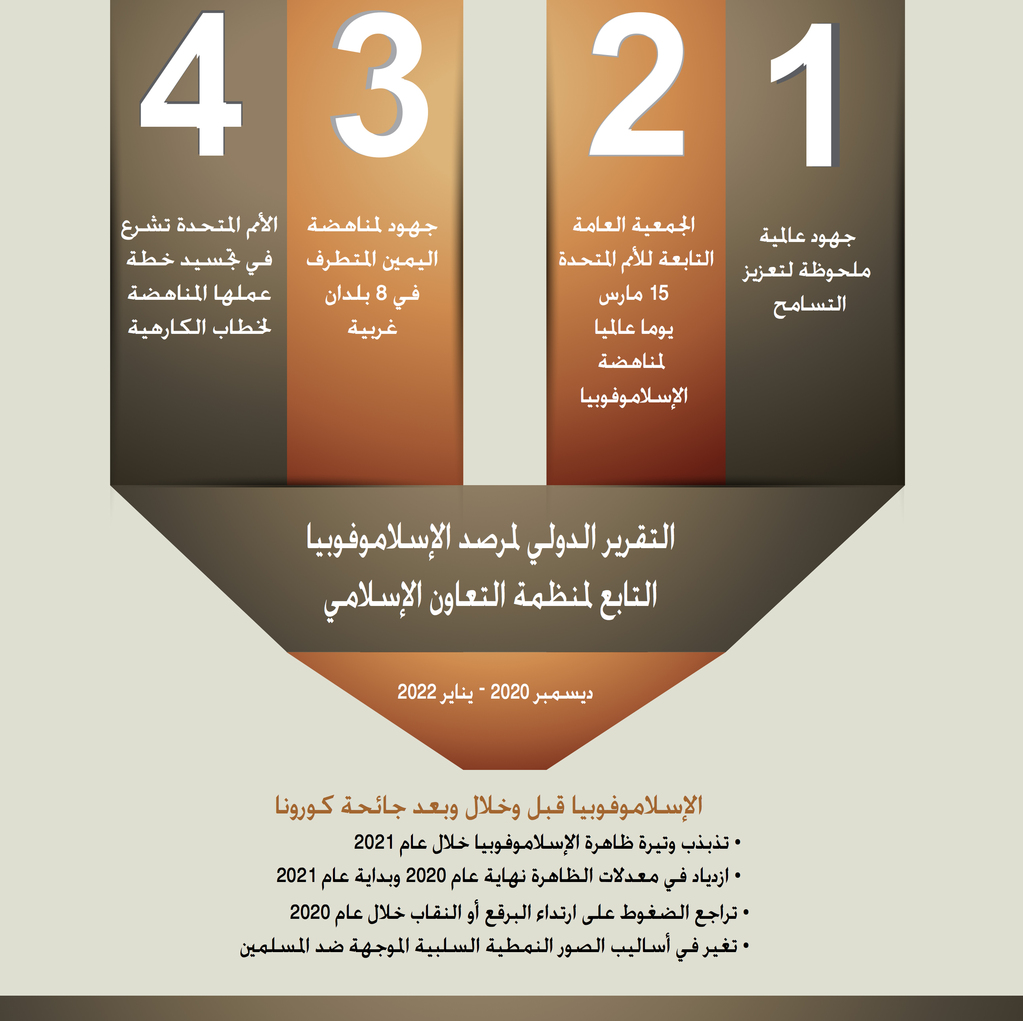
Date: 19/03/2022

The General Secretariat of the Organization of Islamic Cooperation (OIC) is to submit its Islamophobia Observatory periodic report to the 48th session of the OIC Council of Foreign Ministers, to be held in Islamabad, Islamic Republic of Pakistan, on 22-23/3/2022 .
The report listed Covid-19, among the major factors that led to the spread of Islamophobia globally in 2021, along with the agenda of the extreme right, the crisis of immigrants and refugees, attacks by extremist and terrorist groups, as well as the hate speech adopted by some media. The report concluded that Islamophobia would continue, especially with indications that it continued to increase over the past five years. Meanwhile, the increase appeared to have remained constant over the fourteen months from late 2020 to early 2022, with the exception of a noticeable disproportional decrease in 2021.
Measuring the extent of the phenomenon, the report found that Europe ranked first, followed by Asia then North America. The Observatory indicated that France and Britain witnessed the highest rates of activities related to Islamophobia, especially through government policies that seemed to serve increasingly Far-right tendencies. The Observatory report also noted a similar pattern in Asia, especially with regard to India and Sri Lanka, where the phenomenon has intensified due to existing tensions with Buddhist monks in Myanmar and the tension with the Rohingya Muslims. The report indicated that attacks and incidents usually committed by elements of the far-right have receded in the America region. It also specified that different regions of the world witnessed an increase in Islamophobia during the outbreak of the Covid-19 pandemic. Some social media sites blamed Muslims for spreading the virus, claiming that some of them insisted on performing congregational prayers, or deliberately spreading the epidemic. This, and other false stories, resulted in many attacks against Muslims.
The report identified a change in negative stereotypes directed against Muslims through the decrease in the volume of offensive stereotypes of Muslims, matched by its transformation into government policies and political pressures exerted by far-right movements and pressure groups on governments. The report said that there was a decline in incidents of attacks on mosques and copies of the Holy Qur’an, and in incitement to social media or insults directed against the Holy Prophet, may Allah’s peace and blessings be on him.
As for hijab or burqa (face cover) wearing, the report noted that due to the spread of protective medical masks prompted by Covid-19, 2020 witnessed a decline in the severity of rejecting this outfit. However; the problem soon reappeared with the the pandemic receding. France, Switzerland India, and Austria were among the countries that banned hijab in government departments, universities and schools. Other countries such as Belgium, Norway, the Netherlands, Germany, Spain, Italy, Denmark, Bulgaria, Latvia, Kosovo and Sri Lank, adopted less severe policies against the wearing of hijab.
However, the report highlighted some global efforts to promote harmony and tolerance. In addition, measures to support Muslim groups at the level of both the UN and the EU were adopted. The report also underscored efforts exerted against far-right groups in the US, Brazil, Canada, Spain, Britain and Germany and Australia. The UN embarked on implementing its Strategy and Plan of Action on Hate speech. The UN General Assembly has designated 15/3 of each year as the International Day against Islamophobia.